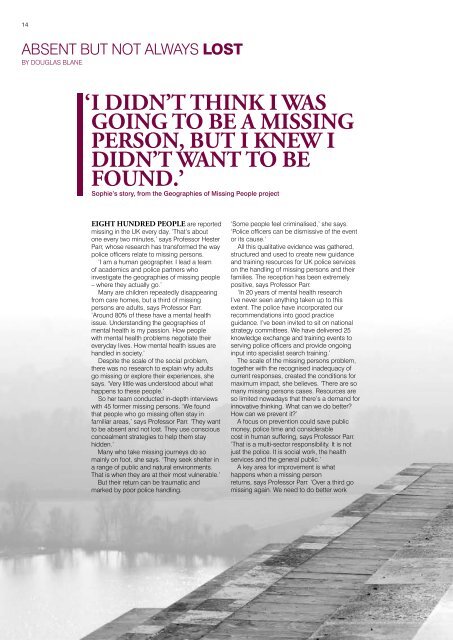Avenue
1NV1yoW
1NV1yoW
Create successful ePaper yourself
Turn your PDF publications into a flip-book with our unique Google optimized e-Paper software.
14 15<br />
ABSENT BUT NOT ALWAYS LOST<br />
BY DOUGLAS BLANE<br />
‘ I DIDN’T THINK I WAS<br />
GOING TO BE A MISSING<br />
PERSON, BUT I KNEW I<br />
DIDN’T WANT TO BE<br />
FOUND.’<br />
Sophie’s story, from the Geographies of Missing People project<br />
EIGHT HUNDRED PEOPLE are reported<br />
missing in the UK every day. ‘That’s about<br />
one every two minutes,’ says Professor Hester<br />
Parr, whose research has transformed the way<br />
police officers relate to missing persons.<br />
‘I am a human geographer. I lead a team<br />
of academics and police partners who<br />
investigate the geographies of missing people<br />
– where they actually go.’<br />
Many are children repeatedly disappearing<br />
from care homes, but a third of missing<br />
persons are adults, says Professor Parr.<br />
‘Around 80% of these have a mental health<br />
issue. Understanding the geographies of<br />
mental health is my passion. How people<br />
with mental health problems negotiate their<br />
everyday lives. How mental health issues are<br />
handled in society.’<br />
Despite the scale of the social problem,<br />
there was no research to explain why adults<br />
go missing or explore their experiences, she<br />
says. ‘Very little was understood about what<br />
happens to these people.’<br />
So her team conducted in-depth interviews<br />
with 45 former missing persons. ‘We found<br />
that people who go missing often stay in<br />
familiar areas,’ says Professor Parr. ‘They want<br />
to be absent and not lost. They use conscious<br />
concealment strategies to help them stay<br />
hidden.’<br />
Many who take missing journeys do so<br />
mainly on foot, she says. ‘They seek shelter in<br />
a range of public and natural environments.<br />
That is when they are at their most vulnerable.’<br />
But their return can be traumatic and<br />
marked by poor police handling.<br />
‘Some people feel criminalised,’ she says.<br />
‘Police officers can be dismissive of the event<br />
or its cause.’<br />
All this qualitative evidence was gathered,<br />
structured and used to create new guidance<br />
and training resources for UK police services<br />
on the handling of missing persons and their<br />
families. The reception has been extremely<br />
positive, says Professor Parr.<br />
‘In 20 years of mental health research<br />
I’ve never seen anything taken up to this<br />
extent. The police have incorporated our<br />
recommendations into good practice<br />
guidance. I’ve been invited to sit on national<br />
strategy committees. We have delivered 25<br />
knowledge exchange and training events to<br />
serving police officers and provide ongoing<br />
input into specialist search training.’<br />
The scale of the missing persons problem,<br />
together with the recognised inadequacy of<br />
current responses, created the conditions for<br />
maximum impact, she believes. ‘There are so<br />
many missing persons cases. Resources are<br />
so limited nowadays that there’s a demand for<br />
innovative thinking. What can we do better?<br />
How can we prevent it?’<br />
A focus on prevention could save public<br />
money, police time and considerable<br />
cost in human suffering, says Professor Parr.<br />
‘That is a multi-sector responsibility. It is not<br />
just the police. It is social work, the health<br />
services and the general public.’<br />
A key area for improvement is what<br />
happens when a missing person<br />
returns, says Professor Parr. ‘Over a third go<br />
missing again. We need to do better work<br />
on return. We have made progress. New<br />
guidance on the police interview, partly arising<br />
from our research, is changing police practice<br />
in this area.’<br />
In recognition of the impact of her research,<br />
the project won an Outstanding Impact in<br />
Society prize from the Economic & Social<br />
Research Council in June 2015. The prize also<br />
helps fund future research.<br />
‘I want to work towards consensus around<br />
what happens when people return,’ says<br />
Professor Parr. ‘Who should support them?<br />
What kind of processes do we need?<br />
‘I want to see the national-level agreements<br />
emerging across the UK being translated<br />
into multi-sector operational practice – by the<br />
police and the other organisations that work<br />
with these very vulnerable people.’<br />
www.geographiesofmissing<br />
people.org.uk<br />
‘ In 20 years of mental health<br />
research I’ve never seen anything<br />
taken up to this extent.’<br />
Professor Hester Parr<br />
ABOUT THE RESEARCHER<br />
Professor Hester Parr is<br />
based in the University’s<br />
School of Geographical<br />
& Earth Sciences. She is<br />
interested in developing<br />
sensitive methodologies<br />
for working with vulnerable<br />
people. Previous research<br />
has investigated the<br />
relationship between<br />
mental health and place by<br />
focusing on how ‘mentally<br />
ill identities’ are defined<br />
by reference to streets,<br />
institutions, cities, regions,<br />
virtualities, natures and<br />
mobilities.<br />
www.glasgow.ac.uk/<br />
people/hesterparr<br />
MISSING VOICES<br />
A series of ten stories of the missing experience<br />
is one of the learning resources to come out of<br />
this project. Listening to these stories – which<br />
have been adapted from real interviews – helps<br />
to prompt new conversations around the missing<br />
experience, as well as encouraging a more<br />
sensitive and empathetic police handling of<br />
missing people.<br />
‘ When the daylight was coming<br />
and I was still alive, that’s when I<br />
started to panic.’<br />
Sophie’s story tells of a 24-hour journey as a<br />
missing person. We hear about her attempted<br />
suicide, being located by her family and the<br />
experience with police officers after she is found.<br />
www.geographiesofmissingpeople.<br />
org.uk/missingvoices


